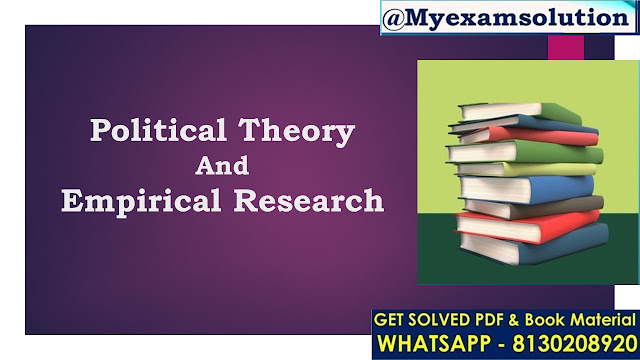What is the relationship between political theory and empirical research
Political theory and empirical
research are two distinct areas of study that are often viewed as separate
disciplines. However, there is a significant relationship between political
theory and empirical research that is essential for understanding political
phenomena. Political theory is concerned with developing normative frameworks
for understanding political phenomena, while empirical research is concerned
with gathering and analyzing data to understand political phenomena. The
relationship between political theory and empirical research is complex, and it
is essential to understand how they work together to gain a deeper
understanding of politics.
What is the relationship between political theory and empirical research:-Political theory is the study of
political ideas, concepts, and theories that are used to understand political
phenomena. Political theorists seek to understand the nature of politics and
the underlying principles that shape political behavior. Political theory is
concerned with the development of normative frameworks for understanding
political phenomena. Political theory includes the study of political
philosophy, political ideologies, and political concepts such as power,
justice, and equality. Political theory is primarily concerned with developing
normative frameworks that help to explain and evaluate political phenomena.
Empirical research is the study of
political phenomena through the collection and analysis of data. Empirical
research seeks to understand political phenomena by gathering and analyzing
data from a variety of sources. Empirical research is concerned with developing
descriptive frameworks for understanding political phenomena. Empirical
research includes the study of political behavior, political institutions, and
political outcomes. Empirical research is primarily concerned with developing descriptive
frameworks that help to explain political phenomena.
Also Read:-
- How Do Political Theorists Approach Questions Of Power And Resistance
- How Have Postcolonial And Decolonial Theories Contributed To Political Theory
- How Does Political Theory Intersect With Questions Of Gender And Sexuality
- How Does Political Theory Contribute To Debates About Environmental Policy And Sustainability
What is the relationship between political theory and empirical research:-The relationship between political
theory and empirical research is complex. Political theory provides normative
frameworks for understanding political phenomena, while empirical research
provides descriptive frameworks for understanding political phenomena.
Political theory and empirical research can complement each other, as normative
frameworks developed through political theory can guide empirical research, and
empirical research can inform the development of normative frameworks.
One way that political theory and
empirical research are related is through the development of hypotheses.
Political theory can provide hypotheses about political phenomena that can be
tested through empirical research. For example, a political theorist might
develop a normative framework for understanding the relationship between
democracy and freedom. This normative framework could then be used to develop a
hypothesis about the relationship between democracy and freedom that could be
tested through empirical research.
What is the relationship between political theory and empirical research:-Another way that political theory
and empirical research are related is through the use of data in political
theory. Political theorists often use empirical data to support their normative
frameworks. For example, a political theorist might use data about the
distribution of income in a society to support their normative framework for
understanding distributive justice. Empirical research can also provide data
that can be used to evaluate normative frameworks developed through political
theory. For example, empirical research on the effects of campaign finance
regulations can be used to evaluate normative frameworks developed through
political theory about the role of money in politics.
What is the relationship between political theory and empirical research:-Political theory and empirical
research can also be related through the use of interdisciplinary approaches.
Political theory can draw on insights from other disciplines, such as
philosophy, economics, and sociology, to develop normative frameworks for
understanding political phenomena. Empirical research can also draw on insights
from other disciplines, such as psychology, anthropology, and history, to
develop descriptive frameworks for understanding political phenomena. By using
interdisciplinary approaches, political theory and empirical research can gain
a deeper understanding of political phenomena.
Finally, political theory and
empirical research can be related through the development of policy
recommendations. Political theory can provide normative frameworks for understanding
policy issues, while empirical research can provide data on the effectiveness
of policy solutions. Political theorists can use empirical research to evaluate
the effectiveness of policy solutions, and policymakers can use normative
frameworks developed through political theory to guide policy decisions.
Empirical Empirical In Political Theories
What is the relationship between political theory and empirical research:-Empirical research has become
increasingly important in political theory over the years. While political
theory has traditionally been focused on developing normative frameworks for
understanding political phenomena, the integration of empirical research has
helped to ground political theory in reality and provide more concrete evidence
for its claims. In this essay, we will explore the role of empirical research
in political theory, its benefits and limitations, and some examples of how it
has been used in the field.
1. The role of empirical research in political theory
Empirical research has several
important roles in political theory. First, it can help to test the validity of
normative frameworks developed through political theory. By gathering data and
analyzing it, researchers can determine whether the claims made by political
theorists hold up in reality. This can help to refine and improve political
theories, making them more accurate and useful.
Second, empirical research can help
to develop new normative frameworks. By observing political phenomena and
analyzing data, researchers can identify patterns and trends that can inform
the development of new normative frameworks. This can help to ensure that
political theory remains relevant and up-to-date, and can help to address new
or emerging political issues.
What is the relationship between political theory and empirical research:-Third, empirical research can
provide a more nuanced understanding of political phenomena. While political
theory can provide broad frameworks for understanding political phenomena,
empirical research can provide more detailed insights into how political
systems operate. This can help to identify specific factors that contribute to
political outcomes, and can help to identify areas for improvement in political
systems.
2. Benefits of empirical research in political theory
The integration of empirical
research into political theory has several benefits. First, it can help to
ground political theory in reality. Political theory can sometimes be
criticized for being too abstract or disconnected from the real world, but the
integration of empirical research can help to address this concern. By using
data to support claims, political theorists can provide more concrete evidence
for their arguments, making them more persuasive and relevant.
Second, empirical research can help
to identify areas for improvement in political systems. By analyzing data on
political outcomes, researchers can identify specific factors that contribute
to success or failure in political systems. This can help to inform policy
decisions and can help to improve political systems over time.
What is the relationship between political theory and empirical research:-Third, empirical research can help
to address issues of bias and subjectivity in political theory. Political
theory can sometimes be criticized for being too influenced by the values and
beliefs of the theorist, leading to bias in their claims. Empirical research
can help to address this concern by providing objective data to support or
refute claims made by political theorists.
3. Limitations of empirical research in political theory
While empirical research can
provide many benefits to political theory, it also has some limitations. First,
it can be difficult to gather accurate data on political phenomena. Political
systems are complex and multifaceted, making it challenging to identify and
measure specific factors that contribute to political outcomes. This can lead
to inaccuracies in data, which can limit the usefulness of empirical research.
Second, empirical research can be
limited by the scope of the data available. Political phenomena can be
influenced by many factors, some of which may not be captured by the available
data. This can limit the ability of researchers to draw conclusions or make
policy recommendations based on their findings.
Finally, empirical research can be
subject to interpretation and bias. While the use of data can help to mitigate
this concern, researchers may still interpret data in a way that supports their
pre-existing beliefs or values. This can lead to bias in their findings, which
can limit the usefulness of empirical research.
4. Examples of empirical research in political theory
There are many examples of how
empirical research has been used in political theory. One notable example is
the study of voting behavior. Political theorists have long been interested in
understanding why people vote and how voting behavior is influenced by various
factors, such as political ideology, socioeconomic status, and demographic
factors.
Conclusion
What is the relationship between political theory and empirical research:-Political theory and empirical
research are interconnected fields that work together to provide a more
comprehensive understanding of political phenomena. Political theory provides
normative frameworks that guide the development of hypotheses and policy
recommendations, while empirical research provides descriptive frameworks that
inform and test normative frameworks. The relationship between political theory
and empirical research is complex, and it is essential to understand how they
work together to gain a deeper understanding of politics. By using
interdisciplinary approaches and drawing on insights from other fields,
political theory and empirical research can collaborate to develop a more
comprehensive understanding of political phenomena and their implications for
society.
FAQ.
Q. What is empirical research?
Ans. Empirical research is a type
of research that involves the collection and analysis of data from observations
or experiments. This type of research is based on the principles of the
scientific method and seeks to understand phenomena through the use of objective,
measurable evidence.
Q. Why is empirical research important?
Ans. Empirical research is
important because it provides objective, evidence-based insights into various
phenomena. By collecting and analyzing data, researchers can make informed
decisions and draw accurate conclusions about a particular topic or issue.
Q. What are some limitations of empirical research?
Ans. Empirical research can be
limited by the scope of the data available, the accuracy of the data collected,
and the interpretation of the data. Researchers may also encounter ethical
issues when conducting empirical research, such as the need to protect the
privacy and well-being of study participants.
Q. What is the process of conducting empirical research?
Ans. The process of conducting empirical
research typically involves several steps, including developing a research
question, designing a study or experiment, collecting data, analyzing data, and
drawing conclusions based on the findings. Researchers must adhere to ethical
guidelines and follow established research protocols to ensure the validity and
reliability of their findings.











